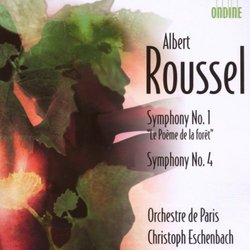| All Artists: Albert Roussel, Christoph Eschenbach, Orchestre de l'Opéra de Paris, Paris Orchestra Title: Albert Roussel: Symphonies Nos. 1 "Le Poème de la forêt" & 4 Members Wishing: 0 Total Copies: 0 Label: Ondine Original Release Date: 1/1/2007 Re-Release Date: 4/10/2007 Genre: Classical Styles: Historical Periods, Modern, 20th, & 21st Century, Symphonies Number of Discs: 1 SwapaCD Credits: 1 UPC: 761195109229 |
Search - Albert Roussel, Christoph Eschenbach, Orchestre de l'Opéra de Paris :: Albert Roussel: Symphonies Nos. 1 "Le Poème de la forêt" & 4
 | Albert Roussel, Christoph Eschenbach, Orchestre de l'Opéra de Paris Albert Roussel: Symphonies Nos. 1 "Le Poème de la forêt" & 4 Genre: Classical
|
Larger Image |
CD Details |
CD ReviewsRousselians, Rejoice! M. De Sapio | Alexandria, VA | 08/31/2007 (5 out of 5 stars) "Until very recently, listeners wanting newer recordings of Roussel's symphonies had few truly good options to choose from. But just in time for the seventieth anniversary of the composer's death (in 2007), a sort of Roussel renaissance seems to be in bloom: besides a classic account of the complete symphonies being reissued on EMI, a terrific version of the Third has appeared on Naxos, and Christoph Eschenbach and the Orchestre de Paris have given us recordings of the First, Second, and Fourth. The Symphony no. 4 in A was the reason I bought this CD, and so it will be under primary consideration here.
Eschenbach seems to come from a solidly German romantic tradition. For all we might think of the mature Roussel as "neoclassical", Eschenbach's approach is entirely appropriate: it brings the weight and architectural grandeur of the music to the fore. Eschenbach's interpretation of the Fourth's Lento molto is superb in every way: the very slow tempo, the LUFTPAUSEN and fluctuations of tempo help to mold the movement into a deeply moving emotional arc. And the outer movements do not loose anything in joyousness, in that Rousselian rhythmic life-force, from the maestro's somewhat heavier approach. The orchestral colors (such as the English horn/strings opening) are fruity and incandescent, inner contrapuntal voices are brought out, and climaxes emerge as powerful washes of sound without being jarring. The First Symphony shows an earlier Roussel very much under the influence of Debussy. The work's subtitle, "Poem of the Forest", says it all: this is an impressionistic tone poem, akin to the paintings by Monet showing the same scene at different times of the day. The movements are titled "Winter Forest", "Renewal", "Summer Evening", and "Fauns and Dryads". Although impressionistic in inspiration, it does not allow atmosphere or pictorial content to overwhelm a sense of proportion and formal discipline. It's a lovely, evocative piece which deserves to be better known. Throughout Eschenbach proves a powerful advocate of this lesser-known repertoire. " |

 Track Listings (8) - Disc #1
Track Listings (8) - Disc #1